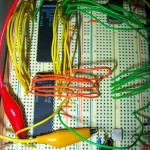CC, eat my ass out:
http://little-scale.blogspot.com/2009/01/chiptuning-atari-pokey.html
The POKEY has a variety of ways that you can tune the chip, including using 8 bit or 16 bit data for the pitch, as well as choosing a direct division of the master clock, a division of 28 (which the eight bit data below is based on) and a division of 120.
http://little-scale.blogspot.com/2009/01/go-go-atari-dualpokey-midi.html

I have started working on a Multi POKEY MIDI setup. This Atari chip is one of my favourites and has some nice distortion type noises on it, as well as some other interesting things.
Current features include:
• Control up to all 16 channels of up to 4 POKEY chips via MIDI
• POKEY 1 appears on channels 1 to 4
• POKEY 2 appears on channels 5 to 8
• POKEY 3 appears on channels 9 to 12
• POKEY 4 appears on channels 13 to 16
• Select the distortion / noise for each voice (set via MIDI CC)
• For each chip, clock it using 15.3 Khz instead of 65.8 Khz (set via MIDI CC)
• For each chip, use ch 2 as a high pass filter, clocked by ch 4 (set via MIDI CC)
• For each chip, use ch 1 as a high pass filter, clocked by ch 3 (set via MIDI CC)
• For each chip, use channels 3 and 4 together in 16-bit mode (set via MIDI CC)
• For each chip, use channels 1 and 2 together in 16-bit mode (set via MIDI CC)
• The 16-bit mode increases the frequency resolution and range of the ganged channels of the chip.
• For each chip, clock channel 3 using 1.8432MHz instead of 65.8 Khz (set via MIDI CC)
• For each chip, clock channel 1 using 1.8432MHz instead of 65.8 Khz (set via MIDI CC)
• For each chip, use 9 bit poly for noise instead of 17 bit poly (set via MIDI CC)
